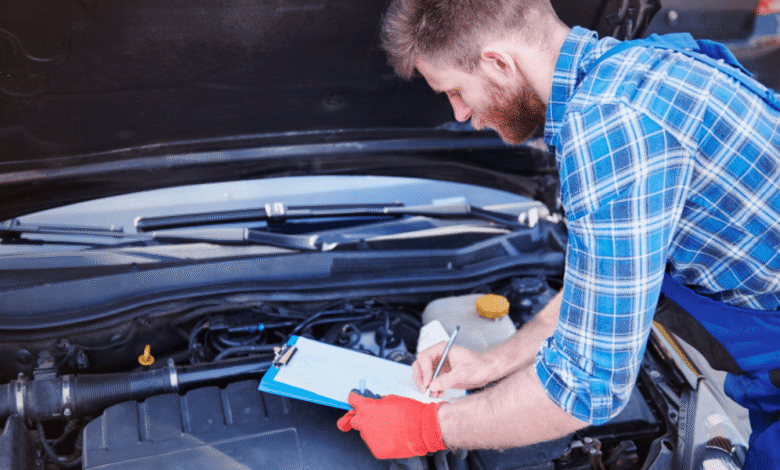VW Coolant Leaks in Dubai? Causes & Fast Solutions

Is your VW engine suddenly running hot for no clear reason? You pop the hood and spot that crusty green puddle near the front tire. Yep, that is coolant. And in Dubaiãs heat, a VW coolant leak The Dubaiô issue is not just annoying; it is dangerous. Overheating does not wait. It creeps up fast, damages your engine block, warps your cylinder head, and turns a minor leak into a massive repair bill. If you drive a Volkswagen in Dubai, ignoring coolant issues can cost more than just your time.
Why VW Coolant Leak Dubai Cases Are So Common
Living in Dubai means your car is always up against the heat, no breaks, no mercy. And if you drive a Volkswagen, your cooling systemô is already doing double the work. The harsh weather here pushes your engine harder, your hoses hotter, and your coolant levelsô lower. Here is why VW coolant leaksô are not rare in Dubai, and why Car Cooling System Inspection in Dubaiô is necessary on time even few drops leak on the ground :
- Heat Weakens Rubber
In many VW coolant leak Dubai cases, constant 45ô¯C+ heat dries out the rubber hoses faster than expected. Over time, rubber loses flexibility and forms small cracks that leak when pressure builds. - Plastic Parts Get Brittle
ô VW expansion tanks and thermostat housings are usually plastic. After a few summers in Dubai, they begin to crack or warp, causing silent but steady coolant leaks. - Stop-and-Go Traffic Cooks the Engine
long idling in traffic is one of the top contributors to VW coolant leak Dubai problems, especially when airflow is limited. Less airflow means your VW radiatorô and the cooling fan must work harder. One weak link and pressure escapes through seals or clamps. - Wrong Coolant Type or Water Mix
ô Mixing different coolants or using regular water in the system causes corrosion and scaling. This eats away at seals and damages metal parts from the inside. - Aging Components Go Unchecked
ô Many Dubai drivers skip regular cooling system inspections. But water pumps, radiator caps, and heater cores all wear out faster in desert conditions. - High-Speed Desert Driving
ô Long drives between Emirates? That kind of load raises internal temperatures quickly. If your coolant level is already low, your engine is at risk of overheating in minutes.
If you notice even a faint coolant smell or a puddle under your Volkswagen, get it checked. Small leaks grow fast in this climate, and a quick fix today can save your engine tomorrow.
Early Warning Signs of a VW Coolant Leak Dubai Issue
A VW coolant leakô does not always start with steam pouring out of the hood. Most of the time, it creeps in quietly, just a drop here, a faint smell there. But in Dubaiãs weather, even a minor leak can spiral into a major overheating issue if you miss the early clues. Here are six clear signals your Volkswagen cooling systemô may be leaking and needs attention:
- Coolant Light Comes On
ô When the low coolant warning shows up on your dash, it usually means the reservoir level has dropped below safe limits. Do not just top it off; check for the reason behind the loss. - Unexplained Overheating
ô If your VW temperature gauge suddenly rises, even on short trips, it could mean coolant is leaking and not circulating properly. Overheating in Dubai traffic? That is your engine crying for help. - Coolant Smell After Driving
ô A sweet, syrup-like smell near the front of the car is often a sign of coolant burning off hot engine parts. That means the leak is small but active and happening near heat sources. - White Smoke from Exhaust (in some cases)
ô If coolant enters the combustion chamber through a damaged gasket, it burns and exits as white smoke. It is rare but serious and worth checking immediately. - Visible Leaks Under the Car
if you spot puddles under the front bumper, it could be a small but growing VW coolant leak Dubai drivers often overlook. It might only leak when the engine is hot, so check right after parking. - Sticky Residue Around Engine Parts
ô Coolant that leaks slowly often leaves behind dry, crusty buildup, usually pink, green, or orange depending on the type used. You will often find it near hose clamps or the expansion tank.
Catching these signs early can save your Volkswagen engineô from serious damage. A quick pressure test or inspection at a reliable VW repair workshop in Dubaiô is always worth it.
Top Reasons behind a VW Coolant Leak Dubai Drivers Experience
When it comes to coolant leaks in VW cars, the source is not always obvious. Many components in the Volkswagen cooling systemô are pressurized, heat-sensitive, and interconnected. A small failure in one area can trigger a larger issue if left unresolved. Below are six of the most common, proven causes of coolant loss specifically found in Volkswagen engines, especially under demanding conditions like Dubai?
- Coolant Flange Failure
the coolant flange, usually located near the cylinder head, is a plastic connector that links coolant lines. Over time, this flange often cracks due to heat cycling a typical cause of VW coolant leak Dubaiô incidents. Leaks often develop at the mating surfaces, and once the seal is compromised, coolant escapes under pressure. - Water Pump Leakage
the VW water pumpô circulates coolant throughout the engine. A worn or corroded internal seal, or a damaged bearing, can cause coolant to seep from the weep hole. In many cases, the leak is only visible when the engine is running at operating temperature. - Radiator Damage or Corrosion
The radiatorãs metal core is prone to corrosion, especially when improper coolant mixtures are used or maintenance is skipped. In VW models, small cracks along the seams or at the plastic end tanks are common failure points. - Cracked Expansion Tank
The coolant expansion tankô in many Volkswagen models is made from translucent plastic, which becomes brittle with age and heat exposure. Hairline fractures can form, often releasing coolant only when the system is fully pressurized. - Thermostat Housing Leaks
the thermostat housing controls coolant flow based on temperature. If the housing warps or the gasket fails, coolant can leak slowly but consistently. This issue often goes unnoticed until significant coolant loss occurs. - Loose or Failing Hose Connections
Hose clamps, especially spring-style clamps used in VW systems, can lose tension over time. This allows coolant to leak from hose joints during engine warm-up and cool-down cycles. In some cases, the hoses themselves become porous and leak under pressure.
Identifying the exact source of a Volkswagen coolant leakô requires a thorough inspection, often including pressure testing and system diagnostics. Ignoring these issues, especially in a climate like Dubai, can lead to overheating, engine damage, or unexpected breakdowns.
Why Ignoring a VW Coolant Leak Is Risky
Letting a VW coolant leakô slide might seem harmless until the damage starts stacking up. In Dubaiãs heat, the margin for error is small. Here is what ignoring it can really cost you:
- Quick Overheating
ô Low coolant, no heat control. Your engine overheats fast, especially in traffic or summer. - Warped Cylinder Head
High heat distorts metal. The cylinder head bends or cracks, leading to major engine issues. - Blown Head Gasket
Overheating blows the gasket. Coolant mixes with oil, and engine performance drops hard. - System Overpressure
Leaks raise internal pressure. Weak hoses, caps, or tanks can suddenly fail under stress. - Damaged Catalytic Converter
ô If coolant hits the exhaust system, it can clog or destroy the catalytic converter. - Breakdown Risk
Ignored leaks often end in breakdowns. Towing, repair delays, and more engine wear follow.
Fixing a small leak now is always better than replacing major parts later.
Fast & Professional Solutions for VW Coolant Leaks
A VW coolant leakô is not something to ignore, not in Dubai. The heat pushes every weak part in your cooling system to the limit. Fixing it right by Car Experts Dubaiô means knowing exactly where the problem is and dealing with it fast. Hereãs how the job gets done properly:
- Pressure Test
ô The cooling system is pressurized when the engine is cool. If pressure drops, the leak is there. It helps spot tiny drips from hoses, radiator seams, or plastic joints that only leak under heat or stress. - Coolant Flange Replacement
ô This plastic piece connects hoses near the engine. Over time, it cracks or warps from constant heat cycling. If itãs leaking, it gets removed, surfaces get cleaned, and a new one gets fitted with the right sealant. - Water Pump Replacement
ô Coolant leaking from the weep hole or slight play in the pulley means the pump is failing. It is replaced before it seizes or leaks worse. If the timing belt runs on the same pulley, both are changed together. - Radiator Replacement
ô A radiator leak usually starts at the plastic side tank or through the corroded core. If itãs dripping or seeping, the radiator is removed and replaced with a fresh unit. Coolant is flushed before installing the new one. - Expansion Tank & Cap
ô A brittle tank or a loose cap lowers system pressure. That means boiling coolant, even when the system looks full. Both are replaced together to restore proper sealing and pressure control. - Coolant Refill & ô Bleeding
ô Once repairs are done, the system is refilled with VW-approved coolant. Then, itãs bled to remove trapped air. If air stays inside, it creates hot spots that damage the engine.
That is the process. No quick patch, no guesswork, just solid, permanent fixes that keep your Volkswagenô safe on Dubai roads.
VW Coolant Leak Repair Cost in Dubai
Wondering what a typical VW coolant leak Dubaiô repair costs? You are not alone. You are not alone. Most drivers do not think about it until they see that puddle under the car or the temperature needle creeping up on a hot day. The truth is, the cost depends on where the leak is and how long it has been left dripping. Some repairs are quick and simple. Others? Not so much. Here is a real-world breakdown to give you an idea:
| Repair Type | Estimated Cost (AED) | What It Covers |
| Coolant Hose or Clamp Replacement | 150ã300 | A loose or cracked hose fixed on the spot,simple, fast |
| Coolant Flange or Thermostat Cover | 250ã600 | Common in many VW models; plastic parts often fail from heat |
| Expansion Tank & Cap | 300ã700 | A worn cap or old tank drops pressure; both are replaced to stop the leak |
| Water Pump Replacement | 800 ã 1,500 | If the pumpãs leaking, it is replaced, sometimes along with the timing belt |
| Radiator Replacement | 900 ã 1,800 | Cracked plastic side tanks or leaking cores mean a full radiator swap |
| Coolant Flush & System Bleeding | 200ã450 | Removes old fluid and air pockets after repair to protect the engine |
ã ÿ¡ Prices vary depending on your VW model, engine setup, and how far the damage has gone.
If you catch the leak early, it might only cost a few hundred dirhams. But wait too long, and youãre looking at major engine repairs. That is why itãs always better to check it out early.
Why Trust Our VW Repair Experts in Dubai
Fixing a VW coolant leakô in Dubai is not just about tools; itãs about knowing the car, the climate, and the pressure your cooling system takes daily. Hereãs why drivers trustô VW Repair Experts in Dubai:
- VW Specialists
ô We work only on Volkswagen systems. From coolant flanges to pumps, we know every weak spot. - Exact Leak Detection
ô We use pressure tests, UV dye, and thermal tools to find the coolant leakô fast, with no guesswork. - OEM-Grade Parts
ô We install original VW partsô or top-grade OEM. No low-quality plastic that fails in the heat. - No Shortcut Repairs
ô Every seal, clamp, and hose is refitted to spec. The system is fully tested before handover. - Real-Time Updates
ô You get full transparency. We show what failed and explain what is needed clearly. - Built for Dubai Roads
ô Repairs are done with Dubaiãs heat and drivingô in mind; coolant mix and pressure rating are all tailored.
That is how your Volkswagen stays safe and cool, even in peak summer.
A VW coolant leak Dubaiô might start small, but in this heat, it never stays that way for long. Whether it is a cracked flange, a worn pump, or a weak tank, ignoring the signs leads to bigger engine problems, sudden breakdowns, and expensive repairs. Acting early saves time, money, and stress.
If your Volkswagenô shows any coolant loss, overheating, or visible drips, do not wait. Let our VW specialists inspect it, find the real issue, and fix it the right way, using tested methods and parts built for Dubai. Book your VW coolant system check today for quick appointments, expert care, and long-term peace of mind.




